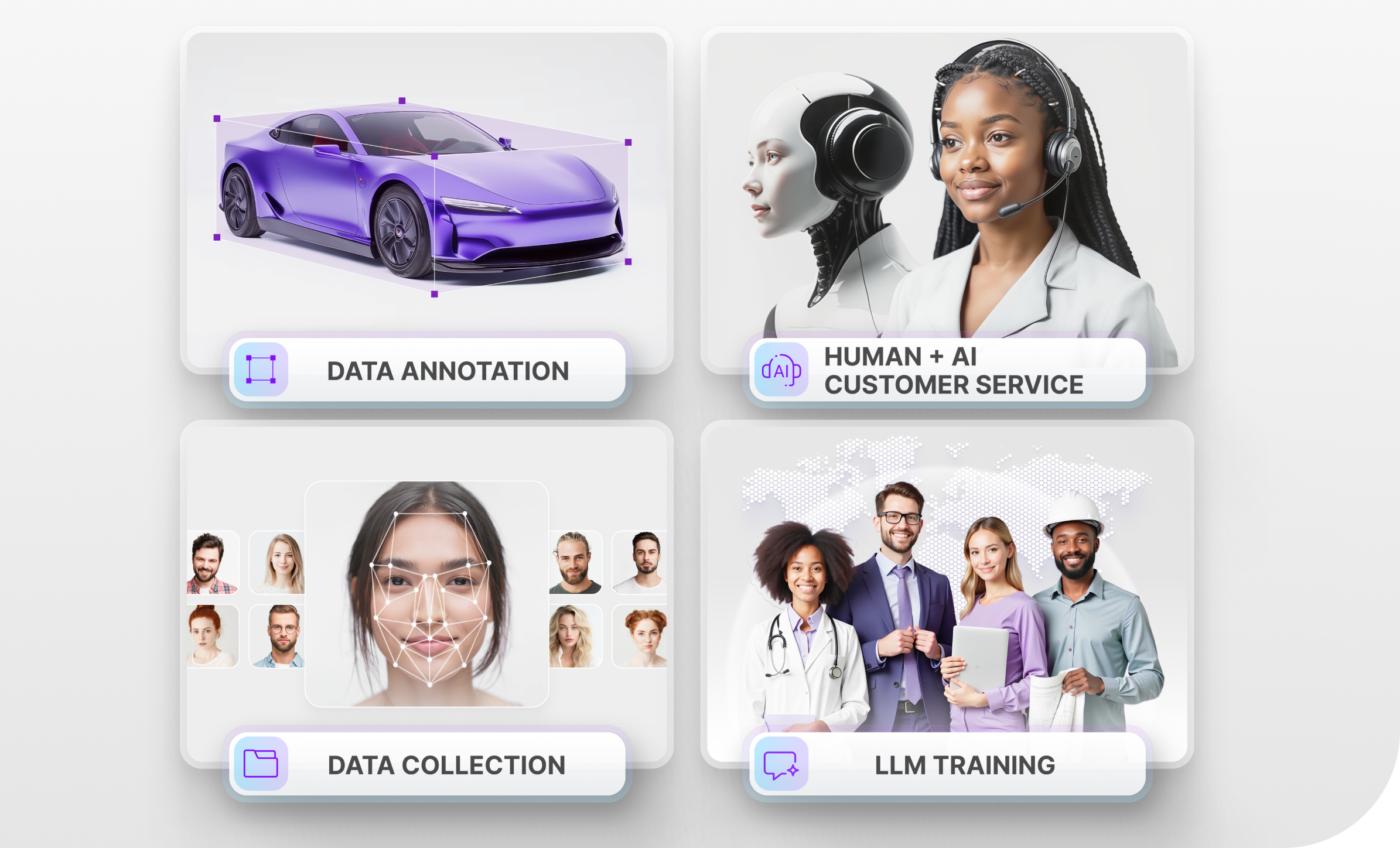Customer Service vs. Technical Support — What They Are & How They Differ
In the world of business, customer service and technical support are often used interchangeably, but they serve distinct roles that are vital to a company’s success. While both aim to enhance the customer experience, their responsibilities, skill sets, and approaches differ significantly. Customer service focuses on addressing general inquiries, resolving issues, and ensuring overall customer satisfaction. On the other hand, technical support deals with more specialized, product-related problems that require a deep understanding of the technical aspects of a company’s offerings. Understanding these differences is crucial for businesses looking to optimize both functions and provide exceptional customer experiences.
What is Customer Support?
Customer support is an umbrella term that encompasses any services your in-house team or offshore team provides to customers to help them resolve issues with your product or service . The end goal of customer service support is to make the customer successful in using your service offering and help build relationships with them so that they refer you to their friends so that you can build your brand reputation and grow your business.
What is Technical Support?
The technical support meaning is any service that resolves a technical issue with your product . While some customers may prefer some self-help option, like a knowledge base article, a lot of customers will not be able to resolve their issues themselves and will require assistance from your team. Technical support teams are very common at (but not limited to) companies offering software, electronic equipment, home appliances, and telecommunication services.
The Main Objectives of Customer Service and Technical Support
The main objectives of customer service and technical support reflect their distinct roles in a company’s operations, though both contribute to the overall goal of ensuring customer satisfaction.
The main objectives of customer service include:
- Providing General Assistance: Customer service focuses on answering inquiries about products, services, policies, and processes, aiming to make the customer’s interaction with the company smooth and pleasant.
- Resolving Non-Technical Issues: Customer service resolves billing questions, order tracking, product returns, and other non-technical concerns, ensuring that customers’ needs are met quickly and efficiently.
- Enhancing Customer Experience: Customer service representatives work to create a positive experience, often handling feedback, complaints, and suggestions to build loyalty and improve relationships with customers.
- Building Trust and Loyalty: By being responsive, helpful, and courteous, customer service fosters trust, encouraging repeat business and customer retention.
The main objectives of technical support include:
- Resolving Product-Related Issues: Technical support focuses on troubleshooting and resolving specific, often complex, technical issues related to a product or service, such as software bugs, hardware malfunctions, or installation problems.
- Ensuring Product Functionality: The goal of technical support is to ensure that a product or service works as intended, helping users solve any functional problems so they can make full use of the product.
- Providing Expertise: Technical support agents offer specialized, in-depth knowledge of a company’s offerings, providing solutions that require a technical understanding of how the product operates.
- Minimizing Downtime: Quick and accurate resolutions are critical in technical support, as prolonged issues can lead to operational disruptions for customers. The objective is to restore normal functionality as soon as possible.
These objectives highlight how customer service focuses on general customer relations and satisfaction, while technical support centers on resolving specific, often complex, product-related issues.
Goals of Customer Service Support
One of the main goals of customer service support is to increase the customers’ satisfaction with your service offering. Usually this is measured in the CSAT score by your customer service team. Another big goal is to retain the customers you already have now. This can be challenging given the increased playing field of competitors, so if you can reduce customer churn, then this would be a big advantage for your business.
Goals of Technical Support
The primary goal of technical support is to ensure that a company’s products or services function optimally for the end user . This involves diagnosing and resolving technical issues, whether they are related to hardware, software, or system configurations, to minimize disruptions and restore full functionality as quickly as possible. Technical support teams aim to provide expert guidance, leveraging their deep knowledge of the product to troubleshoot complex problems and prevent future issues. Another critical goal is to enhance the overall customer experience by providing timely, accurate, and effective solutions, reducing frustration, and ensuring customer satisfaction with the product. Ultimately, technical support strives to maintain product performance, reduce downtime, and build trust through expert assistance.

Key Differences in Skills and Responsibilities
The skills and responsibilities of customer service and technical support differ significantly due to the nature of the tasks each role performs. Here are the key differences:
Skills :
- Customer Service Skills:
- Communication and Soft Skills: Customer service agents rely heavily on strong interpersonal, communication, and listening skills. Their primary task is to engage with customers, understand their concerns, and provide a positive, helpful experience. They must be empathetic, patient, and capable of handling a range of non-technical issues.
- Product Knowledge (General): While some product knowledge is required, customer service representatives usually deal with general questions, policies, or non-technical issues such as billing or order tracking.
- Conflict Resolution: Since customer service often deals with complaints or dissatisfaction, strong conflict resolution skills are necessary to de-escalate tense situations and maintain customer satisfaction.
- Technical Support Skills:
- Technical Expertise: Technical support professionals require deep knowledge of the company’s products, often in areas like software, hardware, or system troubleshooting. They must possess analytical and diagnostic skills to address technical issues effectively.
- Problem-Solving: Technical support requires a focus on solving specific technical problems. This involves critical thinking, troubleshooting, and sometimes creativity in finding solutions.
- Technical Communication: While they must be good communicators, technical support staff also need to translate complex, technical concepts into language that customers can easily understand.
Responsibilities :
- Customer Service Responsibilities:
- Handle General Inquiries: Customer service focuses on answering customer questions related to orders, services, policies, or billing.
- Resolve Non-Technical Issues: They manage customer complaints, process returns or refunds, and ensure overall customer satisfaction with the business’s services.
- Build Customer Relationships: Customer service emphasizes creating a positive experience, fostering trust, and ensuring that customers feel valued.
- Technical Support Responsibilities:
- Troubleshoot Technical Problems: Technical support focuses on diagnosing and fixing product-related issues, often dealing with complex technical problems that prevent the product from functioning properly.
- Provide Product Expertise: They offer specialized knowledge about how the product works, assist with installation, configuration, and maintenance, and ensure that customers can use the product to its full potential.
- Minimize Downtime: Technical support aims to quickly resolve issues that may impact the customer’s ability to use the product, helping to reduce operational disruptions.
Skills Required for Customer Service Support
Customer support and technical support offer different services to the customer and, therefore, require different skill sets. The skills needed to be a part of customer support include the following:
- Communication Skills: Clear, concise, and empathetic communication is essential for understanding customer needs and explaining solutions. This includes both verbal and written communication, especially when dealing with inquiries across multiple channels like phone, email, or chat.
- Active Listening: To resolve issues efficiently, customer support agents must listen attentively to fully grasp a customer’s concerns, showing empathy and patience throughout the interaction.
- Problem-Solving: Customer support involves resolving a wide variety of issues, often in real-time. Agents must be able to think critically and quickly come up with effective solutions, sometimes needing to adapt when situations are unique or unexpected.
- Product Knowledge: A strong understanding of the company’s products or services allows agents to provide accurate information, assist with troubleshooting, and guide customers through processes.
- Patience and Empathy: Dealing with frustrated or confused customers requires patience, understanding, and the ability to remain calm under pressure. Showing empathy helps build rapport and fosters a positive customer experience.
Skills Required for Technical Support
The skills needed to be in technical support include:
- Technical Expertise: That’s because there’s simply no substitute for deep knowledge about a company’s products, services, and technologies. Diagnosing and resolving issues are the parts where technical support professionals should be proficient; this means they should know what software, hardware, networking, and system troubleshooting are.
- Problem-Solving Abilities: Strong analytical and critical thinking skills are necessary for technical support staff to identify the root cause of technical problems and provide effective solutions, which is imperative, often under the pressure of time.
- Communication Skills: You don’t need to know technical knowledge, but it’s important to be able to explain complex things in simple, non-technical language. The more clear and concise a communication is, the more the customer can understand the solutions and become more confident.
- Patience and Empathy: Customers can become frustrated over technical issues, support staff are going to need to be patient and supportive to help guide users through troubleshooting steps while managing their stress or confusion.
- Adaptability and Learning Agility: With the evolution of technology as well comes new tools, new software updates, new technologies that technical support teams need to be on the stick to. In order to stay effective you need to be willing to learn and adapt.
Interactions and Problem-Solving Approaches
The essence of problem-solving in customer service lies in effectively identifying, understanding, and addressing the challenges faced by the customer . This skill set goes beyond issue resolution; it encompasses empathy and practical knowledge to develop solutions that elevate the experience with your brand. In tech support, the first step in problem-solving is to understand the problem clearly and accurately. You need to ask relevant questions, listen actively, and confirm the details with the customer. You also need to identify the symptoms, the root cause, and the expected outcome of the problem.
Interaction Types in Customer Support
When it comes to customer support, the interaction types will be usually about the satisfaction with the product or service you are offering. This is where it is crucial that your agents practice conflict resolution skills. As you may imagine, in tech support, the interaction types will be about specific technological related issues customers will expect your team to troubleshoot.
Technical Problem Solving in Tech Support
The technical problem solving will vary based on the severity of the problem. Usually, there are three levels of tech support and the Level one agent will escalate to Level II if they cannot resolve the problem. All of your tech support agents should be well versed in the product you offer so that they could answer product related questions and minimize the number of cases that get escalated.
Integration and Communication in Organizations
Integration and communication are vital for the smooth functioning of any organization, especially when different departments, such as customer service and technical support, need to collaborate effectively. Integration ensures that various teams work seamlessly together, sharing information and resources to achieve common goals. For instance, when customer service and technical support are well-integrated, they can exchange insights about customer needs and technical issues, leading to faster problem resolution and better customer satisfaction. Effective communication is key to this integration, as it enables departments to stay aligned, share real-time updates, and avoid duplication of effort. By fostering open lines of communication, organizations can enhance efficiency, reduce errors, and create a more cohesive, customer-focused environment.
Role of Customer Service in Business
The role of customer support in business is to keep the CSAT score high, well over 90% . This will help you retain the customers you already have and open up new opportunities for upselling since customers will see that you are trustworthy. Another benefit is that high quality customer support will help give your business a competitive advantage in a crowded marketplace. There is no shortage of companies offering similar products or services and customers will not hesitate to switch away from your company to a competitor.
Role of Technical Support in Technical Issues
The role of tech support in technical issues is to provide troubleshooting services to help resolve any issues the customers may be experiencing. While these may be difficult, it is imperative that you resolve them quickly and efficiently because if customers are experiencing too many technical issues, they will start shopping around for a new solution. In today’s crowded marketplace, there simply is no room for error when it comes to resolving customer issues.
Bridging the Gap: Understanding the Unique Roles of Customer Service and Technical Support
In conclusion, while customer service and technical support both play critical roles in delivering a positive customer experience, they serve distinct purposes and require different skill sets. Customer service focuses on building relationships, addressing general inquiries, and ensuring overall satisfaction, while technical support specializes in troubleshooting product-related issues and providing technical expertise. Understanding these differences allows businesses to strategically staff and train these teams, ensuring they complement each other and provide comprehensive support. By recognizing the unique contributions of both customer service and technical support, companies can create a more seamless and efficient experience that meets both the practical and emotional needs of their customers.





